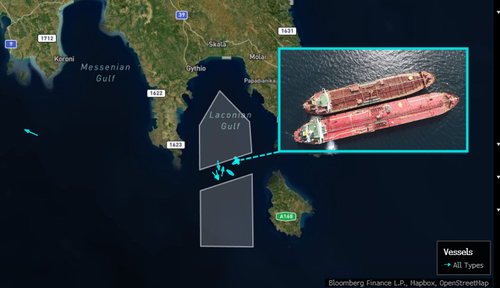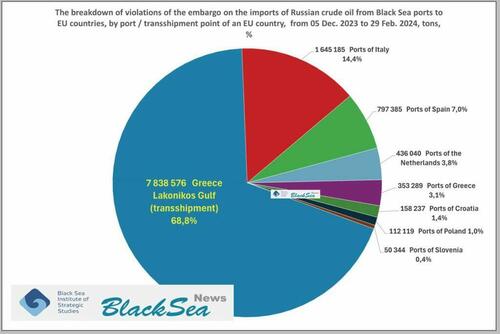
The Greek Navy has established a temporary obstacle in the Laconian Gulf, approximately 110 miles southwest of Athens, to disrupt a 'floating oil base' used by Russian tankers for ship-to-ship transfers of crude oil and related products. These products are then loaded onto other tankers and transported to Asia. This action is part of the West's strategy to curtail Moscow's ability to supply energy to customers evading Western sanctions, thereby limiting funding for the special operation in Ukraine.
Bloomberg reported that the Greek Navy has "re-issued a notice that it would carry out exercises" in the Laconian Gulf area. These previously announced exercises have been extended through June 3. Each notice forces vessels in the region to exit under maritime law.
This month though, the Greek Navy started carrying out exercises in the area in a bid to halt an activity that helps Moscow's export machine to keep functioning. -BBG
Here's a map of where the military exercises will be held.
"There is a gap between the Laconian Gulf and the newly-added area where a lot of the tankers are now clustered," Bloomberg noted.
Greek officials have not publicly stated they are using military exercises against Russia's commercial tanker fleet to deter STS transfers of crude and related products in the sheltered Laconian Gulf area.
We reported earlier this month that the website TankerTrackers reported tankers conducting STS transferred abruptly left the Laconian Gulf for "reasons that were unknown."
STS Russian transfers from the Laconian Gulf have ended up thousands of miles away in Asia. However, according to the Black Sea Group, some of it ended up at European ports because of Brussels' poor sanction management:
"68% of the oil was brought to the Laconian Gulf in Greece for transshipment, while the rest was directly exported to the EU ports amid poor sanctions management," researcher Bohdan Ben wrote in a note.
In a separate Bloomberg report, they noted STS transfers of Russian crude could shift to the Red Sea:
"There are other signs of change in how Russian oil is moving. One tanker also flipped a cargo of crude onto another vessel in the Red Sea last month. The Panta Rei 1 transfered its cargo onto the Odysseus, which then transported its consignment to India. That's the first ever switch observed in that location in ship tracking data compiled by Bloomberg."
This is a new development in how the West fights Moscow. What could possibly go wrong?
The Greek Navy has established a temporary obstacle in the Laconian Gulf, approximately 110 miles southwest of Athens, to disrupt a ‘floating oil base’ used by Russian tankers for ship-to-ship transfers of crude oil and related products. These products are then loaded onto other tankers and transported to Asia. This action is part of the West’s strategy to curtail Moscow’s ability to supply energy to customers evading Western sanctions, thereby limiting funding for the special operation in Ukraine.
Bloomberg reported that the Greek Navy has “re-issued a notice that it would carry out exercises” in the Laconian Gulf area. These previously announced exercises have been extended through June 3. Each notice forces vessels in the region to exit under maritime law.
This month though, the Greek Navy started carrying out exercises in the area in a bid to halt an activity that helps Moscow’s export machine to keep functioning. -BBG
Here’s a map of where the military exercises will be held.
“There is a gap between the Laconian Gulf and the newly-added area where a lot of the tankers are now clustered,” Bloomberg noted.
Greek officials have not publicly stated they are using military exercises against Russia’s commercial tanker fleet to deter STS transfers of crude and related products in the sheltered Laconian Gulf area.
We reported earlier this month that the website TankerTrackers reported tankers conducting STS transferred abruptly left the Laconian Gulf for “reasons that were unknown.”
STS Russian transfers from the Laconian Gulf have ended up thousands of miles away in Asia. However, according to the Black Sea Group, some of it ended up at European ports because of Brussels’ poor sanction management:
“68% of the oil was brought to the Laconian Gulf in Greece for transshipment, while the rest was directly exported to the EU ports amid poor sanctions management,” researcher Bohdan Ben wrote in a note.
In a separate Bloomberg report, they noted STS transfers of Russian crude could shift to the Red Sea:
“There are other signs of change in how Russian oil is moving. One tanker also flipped a cargo of crude onto another vessel in the Red Sea last month. The Panta Rei 1 transfered its cargo onto the Odysseus, which then transported its consignment to India. That’s the first ever switch observed in that location in ship tracking data compiled by Bloomberg.”
This is a new development in how the West fights Moscow. What could possibly go wrong?
Loading…





